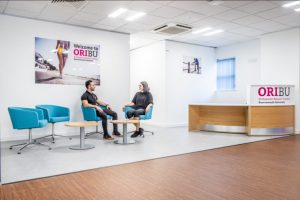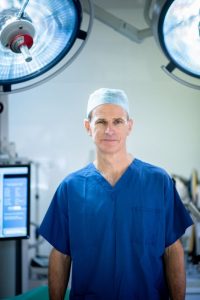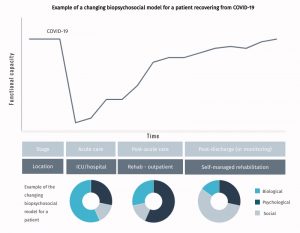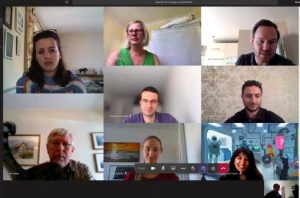This week, the ORI team returned to their offices in the Executive Business Centre for the first time in five months.
The team have been working remotely since 23rd March, when the UK government recommended working from home where possible to reduce the spread of COVID-19. Elective surgeries, such as hip and knee replacements, were cancelled to make bed space for patients, and many research studies were suspended so staff could focus on delivering rapid trials in COVID-19.
Nonetheless, the ORI team have remained as busy as usual. Head of Institute, Professor Middleton was appointed as one of the Medical Commanders at Poole Hospital, to help co-ordinate responses to problems created by the pandemic. CLEAT Trial Manager, Erika Parkinson, was re-deployed to test COVID-19 samples at the Royal Bournemouth Hospital, given her vast experience working in laboratories. The ORI team have published advice and video tutorials for patients with arthritis who had their surgeries postponed, and KTP Associate Claire Forbes and partner company HRV Fit were awarded a grant from Innovate UK, to investigate the relationship between COVID-19 and heart rate variability.
Associate Prof Tom Wainwright and Visiting Fellow Matt Low have published two articles on COVID-19. The first, published in the Journal of Rehabilitation Medicine, highlights the importance of collaborative self-management in the rehabilitation of patients with COVID-19. The second, accepted for publication in Integrated Healthcare Journal, discusses the biopsychosocial model in the context of COVID-19.
Tom Wainwright and Louise Burgess published guidance for exercise specialists working with COVID-19 patients looking to return to physical activity, and Professor Ian Swain has co-ordinated a group of experts to write a review considering the role of electrical stimulation for patients in the ICU with COVID-19. In addition, Prof Swain has published the results of a home-testing protocol, looking at the effectiveness of masks in preventing the spread of respiratory diseases.
Aside from research into COVID-19, the team have published the findings from the most recent CHAIN programme, research on the geko device for DVT prevention, an experimental methodology on lower limb biomechanical analysis and a systematic review on wearable technology and smartphone apps in hip replacement surgery. Dr Ferraro has continued to follow up with patients on the HELLO trial, conducting evaluations over telephone calls.
Fast-forward five months, the team are ready and excited to be back in the office. Following the hard work of the BU Leadership and Estates teams, the campus has been adapted to provide a safe return to the office. As September approaches, the team look towards re-starting their research trials.
Deputy Head of Institute, Tom Wainwright said:
“It is great to see everybody back in the office. The team have been fantastic at adapting to the circumstances over the last months, and whilst we have continued to be busy and productive, it is great to be back on campus and working towards resuming our normal work.“








